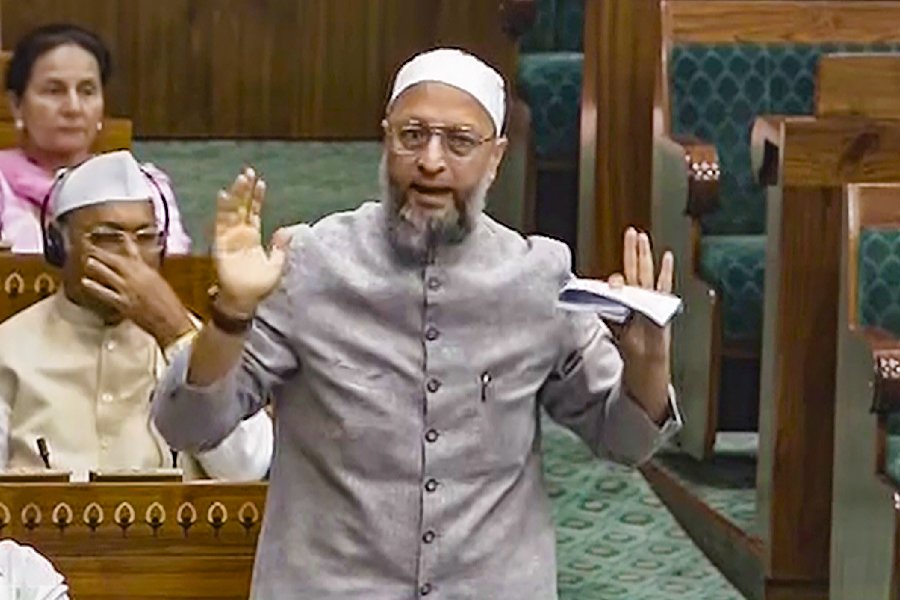As a Hyderabadi, I hardly need to introduce Asaduddin Owaisi — the barrister-politician who inherited the legacy of the All-India Majlis-e-Ittehadul Muslimeen (AIMIM). His family’s political roots run deep in the Old City, where his party has built its empire on a concentrated pocket of community votes. Election after election, AIMIM has managed to hold sway in 8–9 constituencies, surviving not on broader appeal but on a carefully cultivated identity-based vote bank.
Many of us who grew up in Hyderabad cannot forget the troubling spectacle of crackers bursting in certain pockets of the Old City whenever Pakistan won a cricket match. That was not just cricketing passion, it was a symptom of misplaced loyalties — a phenomenon that leaders like Owaisi chose to look away from, if not tacitly encourage. His public life too reflects this pattern: whether it was extending legal aid to those accused in terror-related cases in Hyderabad or elsewhere in India, the aim was to position himself as the sole protector of his community. It is a calculated image — the messiah of one section, rather than a leader of the whole city or nation.
The growth of AIMIM coincides with a demographic shift. From about 3% of India’s population at the time of Independence across India, the community Mr. Owaisi represents now stands at around 15–16%. This rise has been politically channeled into vote bank politics, where parties like Congress and AIMIM struck a silent understanding for decades. Congress played patron, AIMIM played gatekeeper, and both benefited. For long, Owaisi repaid Congress with unstinted support in Parliament, even as his rhetoric outside projected him as uncompromisingly independent.
But the ground is shifting. With the resurgence of Hindu assertion under the BJP-led NDA, the old strategies of identity politics are beginning to falter. The recent elections in Hyderabad gave a glimpse of this when, for the first time, a BJP candidate — a woman born and brought up in the Old City — gave Owaisi a scare. She challenged entrenched bogus voting practices and came closer than anyone before to breaching the AIMIM fortress. Only such anxious moments were given to AIMIM in the past, when the BJP’s one of the tallest leaders, late Baddam Balreddy. That moment underscored an uncomfortable reality: the AIMIM’s monopoly is not as ironclad as it once was.

I remember my days as a reporter in the Assembly. BJP legislators, such as Ch. Vidyasagar Rao, an excellent legal mind, and Baddam Balreddy often raised concerns about Pakistani nationals overstaying in Hyderabad without valid visas. But their voices were drowned by the Congress benches, which brushed such demands under the carpet. The problem of illegal immigration — from Myanmar, Bangladesh, and Pakistan — persisted from the late 1980s onwards. Many of these colonies were quietly transformed into reliable vote banks, first for Congress, and later for AIMIM. This wasn’t governance; this was political manipulation of demography.
Against this background, Owaisi’s recent tears over cricket ties with Pakistan ring hollow. He questions why India plays cricket while breaking talks or reviewing treaties with Pakistan. But the question itself is disingenuous. These are not matters of sport but of national security and sovereignty. For a leader who often invokes patriotism, this line of argument is less about cricket and more about performance politics. Yes, the Constitution gives him the right to theatrics, but it also gives citizens the right to call out hypocrisy.
And hypocrisy there is plenty. Owaisi invokes Dr. B.R. Ambedkar at every turn, presenting himself as the defender of the Constitution. Yet history tells a different story. It was Jawaharlal Nehru, the darling of secular politics, who humiliated Ambedkar, opposing his entry into Parliament and sidelining his voice in nation-building. It is ironic that parties like Congress and AIMIM, which never truly respected Ambedkar, today claim to be his defenders. Contrast this with leaders like Narendra Modi, who have called Parliament the “modern temple of democracy,” a sentiment Ambedkar would likely have approved.
So here is my straightforward appeal to Mr. Owaisi: stop the theatrics. If AIMIM truly stands for secularism, why retain “Muslimeen” in your party’s very name? Why not field candidates from outside your community — Hindus, Christians, Jains — at least in some Old City constituencies? Why not prove your commitment to the Ganga-Jamuni tehzeeb you so often invoke? The answer is obvious: because without religious identity politics, AIMIM’s very survival would be threatened.
But India is changing. The Hindu resurgence is not a temporary wave but a long-overdue correction. People are tired of being manipulated, of seeing illegal immigration turned into political capital, of seeing secularism reduced to token gestures. In the age of social media, truth travels faster than propaganda. Leaders cannot hide behind selective outrage or crocodile tears anymore.
If Mr. Owaisi truly wishes to be seen as a statesman, not just a community leader, he must rise above theatrics. He must shed the politics of grievance and embrace the politics of inclusivity. Otherwise, his speeches may echo loudly in the Old City, but they will fade into irrelevance in the New Bharat that is emerging.





